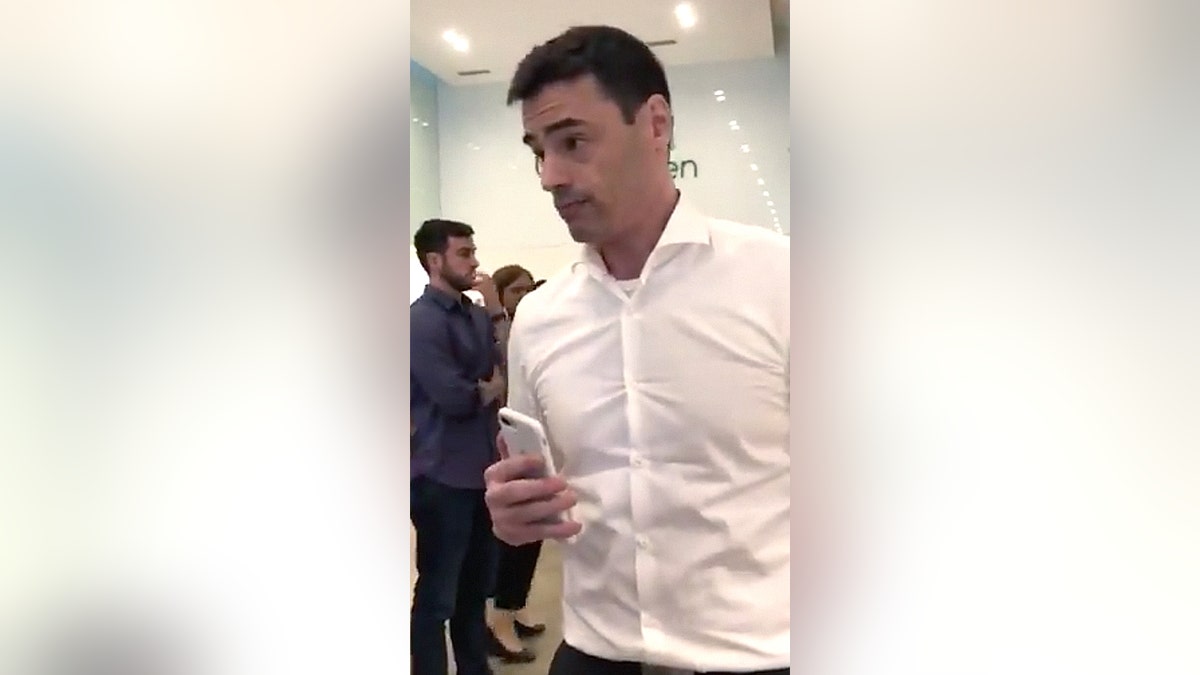
Last week Manhattan lawyer Aaron Schlossberg was caught on video berating employees at a Midtown sandwich place for speaking Spanish. (Twitter)
Last week Manhattan lawyer Aaron Schlossberg was caught on video berating employees at a Midtown sandwich place for speaking Spanish. His racist rant, in which he assumes the Spanish speakers are here illegally and on welfare, spread quickly on the internet.
Once his identity was known, retribution was swift. Angry commenters flooded the reviews for his law practice with one-star ratings, and the company from which he rented his office space informed him he was no longer welcome.
All of this is the predictable result from a viral public-shaming video and few would say that Schlossberg didn’t deserve what he got.
But Rep. Adriano Espaillat and Bronx Borough President Ruben Diaz Jr. are taking it a step further and have filed a complaint against Schlossberg with the Attorney Grievance Committee of the New York State Unified Court System.
Diaz tweeted that Schlossberg’s law license should be “reviewed, and possibly revoked.”
Now we’ve moved beyond shaming to public officials clamping down on private speech. The problem here is that power wielded by politicians isn’t the same as that of someone in the general public. The Attorney Grievance Committee may feel pressure to act on Espaillat and Diaz’s request, and that’s what these officials are counting on.
Political leaders plainly have more power than the rest of us. That’s why conservatives can complain about CNN and liberals can complain about Fox News but it’s very different when Presidents Donald Trump and Barack Obama both did it.
So it gets particularly touchy when a politician attempts to harm someone’s livelihood over speech they don’t like. It’s been a common theme among New York City politicians recently.
In February, the National Rifle Association attempted to hold a fundraising dinner at Gargiulo’s restaurant in Coney Island, Brooklyn. Several politicians, including Rep. Hakeem Jeffries, city Comptroller Scott Stringer and Sen. Diane Savino, issued a statement asking the restaurant to cancel the event. The restaurant, of course, did just that.
The event was then moved to The Grand Prospect Hall in Park Slope and received the condemnation of Borough President Eric Adams, City Councilman Brad Lander and Assemblyman Robert Carroll. The Grand Prospect Hall also canceled.
When the event finally took place in Dyker Heights, Councilman Justin Brannan gloated that the group had to sneak around to hold the event.
Lest we imagine he limits this type of attack on free speech to the NRA, Brannan was also proudly responsible for pressuring the Dyker Beach Golf Club to cancel a Brooklyn Republican Party event featuring ex-Trump aide Seb Gorka.
Perhaps it would be easier if Councilman Brannan just issued a list of who is allowed to speak in his community.
It’s not surprising that the restaurants ditched the NRA event when pressured by politicians. Politicians can easily make their lives more difficult through a range of government agencies.
For example, they can ask the IRS to take a closer look at a business that dares host an event of which they disapprove. This isn’t a conspiracy theory: In 2012, Peter Welch, a Democratic congressman from Vermont, wrote a letter to the IRS asking it to investigate conservative Tea Party groups. The IRS then did just that.
Free speech isn’t supposed to be free of consequences — but it is supposed to be free of governmental intervention. Protected speech isn’t a safe space, and wanting to keep a firm separation between private speech and public action isn’t being a “snowflake.”
You can get fired for your speech, you can suffer personally, your clients can desert you for yelling at sandwich-place employees, but freedom of speech as assured by the First Amendment is specifically freedom from the state preventing that speech or punishing you for it. These recent incidents blatantly cross the line, and the politicians expect us not to notice.
Schlossberg’s speech was repulsive, and few will feel sorry for him that he reaps the repercussions of that, but the First Amendment specifically exists to protect the speech we find repugnant. It wouldn’t be so crucial if it only worked to protect speech that our politicians find palpable (a category that would quickly disintegrate into monklike silence).
Schlossberg’s community should be the one punishing him, not the state. And New York politicians should get out of the business of censoring speech, and threatening businesses, altogether.








































